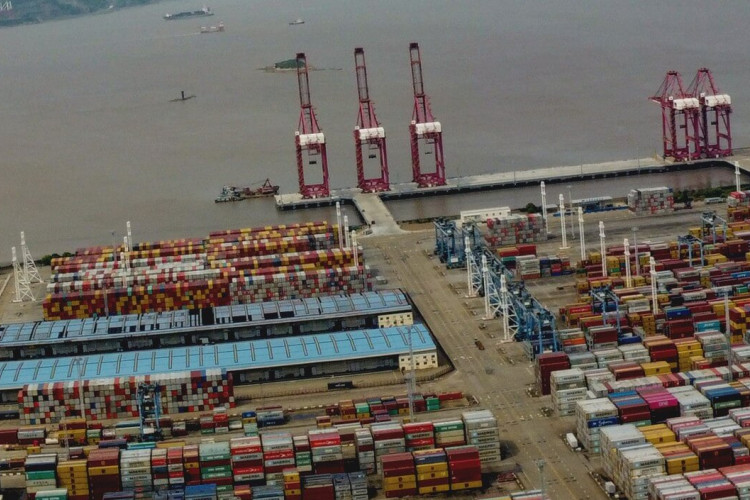Friday’s container explosion resulted in delays to loading and unloading activities, and has put safety in shipping back in the spotlight.
Online container trading and leasing marketplace Container xChange has said that Ningbo Beilun’s Phase III Terminal, where a significant container explosion occurred on Friday, has resumed loading and unloading operations following a 60-hour closure.
The explosion involved a container onboard the Yang Ming vessel YM Mobility, which is now expected to be out of operation for three months.
The cause of the accident remains under investigation In a statement issued on Friday, Yang Ming said that the preliminary findings suggest that an explosion had occurred in a container loaded with dangerous goods on board.
“According to the shipper’s declaration, the container was a reefer used as a substitute for a dry container, without requiring power connection. Immediate fire control measures were taken, and the situation is now under control. All crew members have safely evacuated. Huan Ming (Shanghai) International Shipping Agency Co., Ltd., a subsidiary of Yang Ming Group, is actively coordinating with the authorities to manage the situation,” said the shipping line.
In a subsequent update issued on Saturday, the shipping line stressed that the “exact cause of the incident remains to be clarified under professional assessment”.
“Yang Ming is actively coordinating with the authorities and experts for an immediate response. Once the incident is fully resolved, Yang Ming will assess the possibility and feasibility of vessel repairs, cargo transshipment, and schedule adjustments, with the safety of personnel and the vessel as the top priority. Further updates will be provided as new information becomes available,” concluded the company’s statement.
According to Container xChange, the container that exploded was loaded with hazardous materials on August 9th.
How the accident has impacted operations at Ningbo Port As a result of the explosion, Ningbo Beilun’s Phase III Terminal was closed to loading and unloading operations for some 60 hours before reopening at midnight on Monday (00:00 on August 12th). Container xChange adds that the terminal has begun gradually resuming normal operations.
Commenting on the situation, Christian Roeloffs, co-founder and CEO of Container xChange, said:
“For container trading companies and those involved in container leasing, this incident presents some straightforward challenges worth accounting for. The disruption at the Ningbo Port, combined with pre-existing congestion at major Asian ports, will lead to a deterioration of ocean schedules and further delays in container availability in the coming weeks. Companies must prepare for increased dwell times and a tightening of available container supplies, especially for hazardous and dangerous goods.”
Dealing with potential disruption In response to the disruption caused by the explosion and the subsequent delays in loading and unloading activities at Ningbo Beilun’s Phase III Terminal, Container xChange has made a number of recommendations.
These include the evaluation and exploration of alternative shipping routes through less congested ports, and the prioritisation of rigorous inspections and adherence to safety protocols, particularly those related to hazardous goods.
Container xChange also warned that businesses should anticipate longer dwell times at major ports and adjust inventory and delivery schedules accordingly. The company also said shippers should consider increasing inventory levels to mitigate disruptions.
Safety back in the spotlight The accident has also sparked calls for the logistics industry to double down on safety.
Reacting to the incident, Peter Sand, Xeneta Chief Analyst, said:
“This type of incident should never happen and is another example of how one failure in ocean container shipping can have catastrophic consequences. Had this explosion happened at sea rather than at berth in port then the crew and ship would have been in even more perilous danger. An investigation will take place and the industry must learn from it. Container ships are used to transport hazardous and potentially explosive cargo, so it is of paramount importance that robust safety measures are in place.”
Offering his thoughts on the safety in shipping in light of recent developments, renowned shipping expert Lars Jensen said on LinkedIn:
“I do not have the newest casualty statistics, but a few years ago the average was a fire on a container vessel every 2 weeks – it would seem that nothing much has improved.”
Accident “unlikely” to have a significant market impact Despite the size of Ningbo Port and its significance to the region (Ningbo-Zhoushan handles more than 100 000 TEU per day), Sand does not believe the closure will have a big market impact:
“Ningbo-Zhoushan is a hugely important and well-connected port in the Far East, second only to Shanghai in China and on par with Singapore. It is a critical hub for container shipping and this incident is deeply concerning from a safety perspective, but it is unlikely it will have a significant impact on the market.”






